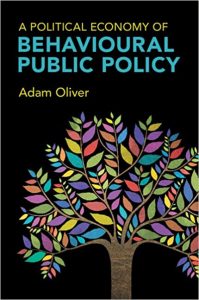Adam Oliver introduces his new book, A Political Economy of Behavioural Public Policy, and makes the case for placing behavioural public policy in a liberal framework.
A Behavioural Public Policy for Liberals
 There has been much interest in informing the design of public policy with findings from behavioural science – a distinct subfield of public policy called ‘behavioural public policy’ – over the past 15 years. My own work encapsulates this interest, culminating in my new book, A Political Economy of Behavioural Public Policy. This is the final part of a trilogy that I wrote for Cambridge University Press on the origins, development and possible future of the field.
There has been much interest in informing the design of public policy with findings from behavioural science – a distinct subfield of public policy called ‘behavioural public policy’ – over the past 15 years. My own work encapsulates this interest, culminating in my new book, A Political Economy of Behavioural Public Policy. This is the final part of a trilogy that I wrote for Cambridge University Press on the origins, development and possible future of the field.
The main catalyst for behavioural public policy was Richard Thaler and Cass Sunstein’s 2008 book, Nudge, which caught the attention of public policymakers. The conceptual approach proposed by Thaler and Sunstein was termed libertarian paternalism, applications of which are called ‘nudges’. Their approach is a soft form of paternalism: in other words, it aims to change behaviours to mitigate so-called behavioural biases in human decision-making for the benefit of those targeted, but without the use of mandates.
The original requirements for an intervention to be labelled a ‘nudge’ were that it ought to target internalities rather than externalities (that is, focusing on the harms people cause to themselves rather than to others); that it preserves liberty; that it is not overt persuasion or simple information provision; that it entails no significant financial incentives; and that it is informed by behavioural science.
The principal argument made by behavioural paternalists is that particular behavioural influences cause errors in individual decision-making. These, in turn, often cause their automatic reflexive choices to conflict with what they deliberatively believe is good for them (with the assumption that what is ‘good’ for them – what brings them outcomes-based welfare – is what they would ideally prefer to do). Thus, the choice architecture is modified with knowledge of the behavioural influences so that people are more likely to make automatic choices that, on reflection, they prefer for themselves.
However, in the intervening years, the nudge requirements have been adhered to very loosely. This has been exacerbated by the frequent fixing of ‘qualifiers’ to the word ‘nudge’ (for example, educational nudges, informational nudges, social nudges, green nudges) to label interventions that are often devoid of the original ‘nudge’ requirements.
The extension of the range of interventions that have been advocated as nudges to externality concerns, pure information provision, financial incentives, regulations and more is explained by its original definition offering limited scope for what behavioural science can offer policy design. Soft demand-side paternalistic interventions are, after all, unlikely to substantively tackle the profound challenges – climate change, poverty and illness alleviation, misinformation – that contemporary societies face (see, for example, Nick Chater and George Loewenstein 2022; Oliver 2015). But the use of ‘nudge’ to describe policy interventions that are not nudges at all (and that sometimes do not even have any behavioural science content) has resulted in a loss of intellectual clarity.
Placing that issue to one side, a main point of debate for the future development of behavioural public policy is whether the emphasis upon paternalistic intervention that has dominated the development of the field to date ought to continue. Instead, would behavioural public policy be more appropriately and profoundly placed within a liberal framework? There has been some movement towards behavioural-informed liberal frameworks in recent years – for example, Mario J Rizzo and Glen Whitman, Robert Sugden and Chater (forthcoming). My book, A Political Economy of Behavioural Public Policy, offers a unique overarching behavioural-informed political economy in the liberal tradition.

Photo by Alex Gorin on Unsplash
The liberal approach that I espouse in the book poses two key challenges to the assumptions underlying behavioural paternalism. Firstly, it contests the assumption that people necessarily seek, and ought to seek, the maximisation of their own outcomes-based concept of welfare (or utility or happiness), and that policymakers should therefore adopt a welfarist planning perspective. For many people, when making decisions, desires (for want of a better word) invariably come before any consideration of outcomes-based welfare; thus, people often deliberately make decisions that conflict with what a welfarist might view are good for them. Given that individual desires vary within and between people, a third party (like a policymaker) cannot hope to understand what individuals wish for themselves. This makes it difficult to design policy that aims to achieve some aggregate conception of societal ‘welfare’, as this will inevitably conflict with what many (perhaps most) people want.
Secondly, the liberal approach challenges the assumption that the behavioural influences uncovered by behavioural economists specifically, and behavioural scientists more generally, necessarily cause biases and errors in individual decision-making. These influences are assumed by behavioural paternalists to be bias-inducing. This is because they have retained the normative claim of standard rational choice theory: namely, that people ought to maximise outcomes-based welfare (and, as a corollary, ought to be consistent in their decision-making across time and context). However, if people have varied desires – if they do not wish to pursue a single concept of welfare – then inconsistency in their preferences and decisions is legitimate. The behavioural influences lie deep within human cognition. It is likely that they evolved for ecologically valid reasons, otherwise one may assume that by now they would not be so ubiquitous. In short, the behavioural influences may facilitate people in the pursuit of their (legitimate) context-dependent desires.
Refuting the assumption that the behavioural influences justify a paternalistic emphasis on welfare maximisation does not, however, negate the potential use of the behavioural influences in a liberal approach. Indeed, they can be used in a number of profound ways. For example, they can inform the use of regulations to mitigate behavioural-informed externalities (see, for example, Oliver 2013). Although the behavioural influences may have evolved over eons to facilitate people in the pursuit of their own desires, implicit and explicit knowledge of these influences may help certain interests to manipulate people to undertake actions and behaviours that serve the interests of the manipulators, but that may harm the manipulated.
Such influences are often used, particularly in the modern world, to undermine the exchange mechanism between contracting parties. For instance, an online gambling company may use mechanisms that cause people to deem acceptable extraordinarily high maximum recommended daily gambling stakes; a payday loan company may make salient the joys of spending in the immediate moment and downplay the pain of repayment. There is therefore a liberal argument to regulate the extent to which one party may manipulate another in order to protect the notion of free and fair ‘contracts’.
A liberal approach also allows the use of behavioural science to improve individual agency, so long as individual autonomy is ultimately left untouched, as perhaps exemplified by the ‘Boost’ and ‘Think’ approaches (see, for example, Ralph Hertwig and Peter John et al). Boosters, for instance, argue that people often lack the cognitive abilities to fully process the complex decisions that modern humans face (for example, in relation to health and finances), and thus they attempt to reframe options – and improve agentic capabilities – so that they are easier for people to understand. The emphasis is on helping people to make a fully informed decision rather than manipulating their decision. Think policies, as the term suggests, aim to encourage people to engage in deeper deliberation before making their decisions to counter any ‘errors’ they may make in their automatic, reactive choices. ‘Boost’ and ‘Think’ can thus be thought of as forms of education, which many classical liberals would presumably endorse.
A theme that runs through the writings of classical liberals is that humans, in the pursuit of their own life objectives, have a deep, almost instinctive, drive to reciprocate with others (see, for example, Oliver 2019). Admittedly, some scholars who are not normally classified as liberals (for example, Peter Kropotkin), and who are even active critics of liberalism (for example, Karl Polanyi), make similar arguments. However, a liberal approach to behavioural public policy allows for the broad institutional framework of society to be organised to try to ensure that reciprocal instincts are not replaced by the more egoistic sentiments assumed under standard rational choice theory.
Overall, my new book argues that although soft paternalistic approaches have dominated the rhetoric of behavioural public policy to date, a liberal approach to the field is not only more ethically defensible but also more likely to substantively address the challenges that modern societies face.
Note: This post gives the views of the author, and not the position of the LSE Review of Books blog or of the London School of Economics and Political Science.






